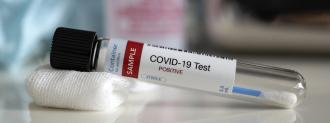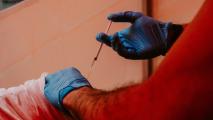The FDA has issued its first emergency use authorization for a COVID-19 antigen test, a new type of test for diagnosing COVID-19.
The antigen test (“Sofia 2 SARS Antigen FIA”) is the work of the San Diego-based healthcare company Quidel Corporation.
While it’s not as sensitive as the standard PCR test, which looks for the virus’s genetic code, it is both faster and cheaper — meaning it could help the United States finally scale up testing to the levels needed to control the epidemic.
The First Antigen Test
The antigen test looks for fragments of the virus proteins that trigger the body’s immune response. This is not to be confused with an antibody test, which looks for the virus-fighting antibodies that the immune system creates to fight off the disease.
(Antibody tests for COVID-19 are mostly used to determine who has already had the disease and recovered — rather than to diagnose active cases — because antibodies often take weeks to show up after someone is infected.)
If the antigen test detects the protein fragments in a specimen sample, the person likely has an active coronavirus infection.
A PCR test for the virus’s genetic material can also diagnose an active coronavirus infection, but the genetic material in a sample must be multiplied millions or even billions of times to create enough to test.
But because the protein fragments detected by an antigen test are relatively large, this step can be skipped.
That can save on both the cost of manufacturing the test, as well as valuable time — Quidel’s antigen test delivers results in 15 minutes, compared to a few days for the average PCR test.
Additionally, while PCR tests can require specialized equipment and analysis by trained experts, Quidel’s test runs on its test-analyzer instrument, called Sofia, which many medical providers already use to diagnose the flu and strep throat.
“It’s a very rapid test that could be used in a doctor’s office,” former FDA Commissioner Scott Gottlieb told CBS’s “Face the Nation.”
“Doctors now have about 40,000 of these Sofia machines already installed in their offices,” he continued.
Gottlieb predicts that the test will cost about $5.
Quidel has yet to comment on pricing, but CEO Douglas Bryant did tell the Wall Street Journal that the company will manufacture 200,000 kits for the test this week, with the expectation of scaling up to a million tests a week “within several weeks.”
Help Diagnosing COVID-19
The authorization of Quidel’s antigen test should help scale up coronavirus testing in the U.S. However, it’s not without its shortcomings — the main one being accuracy.
If the test determines that a patient’s sample contains the coronavirus, it very likely does. However, the test delivers a high rate of false negatives — for every 100 positive samples it tests, it only detects the coronavirus in 85.
For comparison, one recent analysis of 11 PCR test kits found that they all caught at least 96 out of every 100 positive samples.
We’ll never be able to do 300 million PCR tests a day. But we might be able to do that many antigen tests.
Deborah Birx
That means a negative result on Quidel’s antigen test alone isn’t enough to actually rule out an infection — a patient would need to have their negative status confirmed by a PCR test.
Still, the antigen test will likely help the U.S. identify many more coronavirus carriers, who could then immediately begin quarantining themselves, slowing the spread of the virus until a COVID-19 vaccine is ready.
The fact that the test is cheap and fast could also make it ideal for the kind of regular widespread testing needed to safely lift lockdown restrictions.
“There will never be the ability on a (PCR) test to do 300 million tests a day or to test everybody before they go to work or to school,” Deborah Birx, head of the White House Coronavirus Task Force, said on April 17. “But there might be with the antigen test.”
We’d love to hear from you! If you have a comment about this article or if you have a tip for a future Freethink story, please email us at [email protected].






